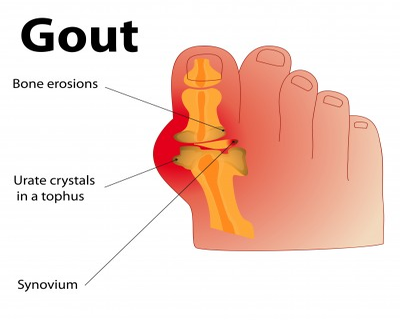- Home
- Editorial
- News
- Practice Guidelines
- Anesthesiology Guidelines
- Cancer Guidelines
- Cardiac Sciences Guidelines
- Critical Care Guidelines
- Dentistry Guidelines
- Dermatology Guidelines
- Diabetes and Endo Guidelines
- Diagnostics Guidelines
- ENT Guidelines
- Featured Practice Guidelines
- Gastroenterology Guidelines
- Geriatrics Guidelines
- Medicine Guidelines
- Nephrology Guidelines
- Neurosciences Guidelines
- Obs and Gynae Guidelines
- Ophthalmology Guidelines
- Orthopaedics Guidelines
- Paediatrics Guidelines
- Psychiatry Guidelines
- Pulmonology Guidelines
- Radiology Guidelines
- Surgery Guidelines
- Urology Guidelines
Management of Acute and Recurrent Gout: ACP latest guidelines

Gout is a form of inflammatory arthritis characterized by recurrent attacks of a red, tender, hot, and swollen joint. Pain typically comes on rapidly in less than twelve hours. The joint at the base of the big toe is affected in about half of cases. It may also result in tophi, kidney stones, or urate nephropathy.
Gout is due to elevated levels of uric acid in the blood. This occurs due to a combination of diet and genetic factors. At high levels, uric acid crystallizes and the crystals deposit in joints, tendons and surrounding tissues, resulting in an attack of gout. Gout occurs more commonly in those who eat a lot of meat, drink a lot of beer, or are overweight. Diagnosis of gout may be confirmed by seeing the crystals in joint fluid or tophus. Blood uric acid levels may be normal during an attack.
Treatment with nonsteroidal anti-inflammatory drugs (NSAIDs), steroids, or colchicine improves symptoms. Once the acute attack subsides, levels of uric acid can be lowered via lifestyle changes and in those with frequent attacks, allopurinol or probenecid provides long-term prevention. Taking vitamin C and eating a diet high in low fat dairy products may be preventive.
Gout has become more common in recent decades. This is believed to be due to increasing risk factors in the population, such as metabolic syndrome, longer life expectancy and changes in diet. Older males are most commonly affected. Gout was historically known as "the disease of kings" or "rich man's disease". It has been recognized at least since the time of the ancient Egyptians.
On 1st November 2016, American College of Physicians (ACP) has released guidelines for Management of Acute and Recurrent Gout. Following are the major recommendations :
Recommendation 1:
ACP recommends that clinicians choose corticosteroids, nonsteroidal anti-inflammatory drugs (NSAIDs), or colchicine to treat patients with acute gout. (Grade: strong recommendation, high-quality evidence)
ACP recommends that clinicians use low-dose colchicine when using colchicine to treat acute gout. (Grade: strong recommendation, moderate-quality evidence)
ACP recommends against initiating long-term urate–lowering therapy in most patients after a first gout attack or in patients with infrequent attacks. (Grade: strong recommendation, moderate-quality evidence)
ACP recommends that clinicians discuss benefits, harms, costs, and individual preferences with patients before initiating urate–lowering therapy, including concomitant prophylaxis, in patients with recurrent gout attacks. (Grade: strong recommendation, moderate-quality evidence)
You can read the full Guideline by clicking on the link :
http://annals.org/aim/article/2578528/management-acute-recurrent-gout-clinical-practice-guideline-from-american-college

Disclaimer: This site is primarily intended for healthcare professionals. Any content/information on this website does not replace the advice of medical and/or health professionals and should not be construed as medical/diagnostic advice/endorsement or prescription. Use of this site is subject to our terms of use, privacy policy, advertisement policy. © 2020 Minerva Medical Treatment Pvt Ltd